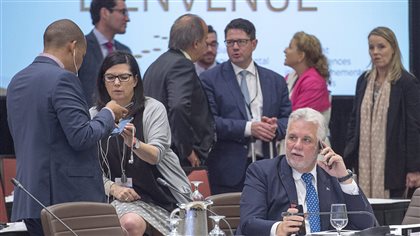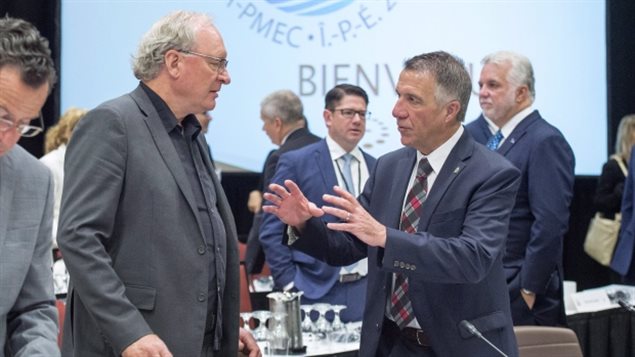The Council of Atlantic Premiers met with their counter-parts from the United States today in Prince Edward Island.
Premiers from the eastern provinces of Newfoundland & Labrador, Nova Scotia, the bilingual province of New Brunswick, P.E.I. and the French-speaking province of Quebec, met with their counterparts from across the border.
U.S. Governors from the states of Vermont, Masachusetts, Maine, New Hampshire and Rhode Island, were hosted in Charlottetown, P.E.I, often described as the home of Canadian Confederation, which is marking a 150-year history this year.

But today, discussions between the assembled leaders focused on trade, climate change, and new energy solutions.
These meetings have been taking place annually, with the exception of a few years, since 1973.
This year, with the backdrop of the North American Free Trade Agreement (NAFTA) being re-negotiated, or modernized, as many people have described it, trade is in the spotlight.
The North American Free Trade Agreement covers the three north American countries of Mexico, the United States and Canada
On the eastern seaboard, however, softwood lumber, a dispute that has been an ongoing subject for debate and renegotiation for most of the twentieth century.
New Brunswick Premier Brian Gallant is going to Washington tomorrow in a final effort to have his province exempted from hefty duties on softwood lumber exports.
It’s the second time in two months that Gallant will meet with U.S. Commerce Secretary Wilbur Ross to make New Brunswick’s case, before a final determination expected in early September.
The U.S. Department of Commerce walloped Canada with an additional 6.87 per cent in preliminary average anti-dumping tariffs in June, with the forestry industry now facing average duties of about 27 per cent.
The other three Atlantic provinces were exempt from the decision, but New Brunswick, which was exempt in the past, was not in this recent case.
Hundreds of business representatives were also in Charlottetown, for “matchmaking” sessions developing new cross-border trading relationships.







For reasons beyond our control, and for an undetermined period of time, our comment section is now closed. However, our social networks remain open to your contributions.